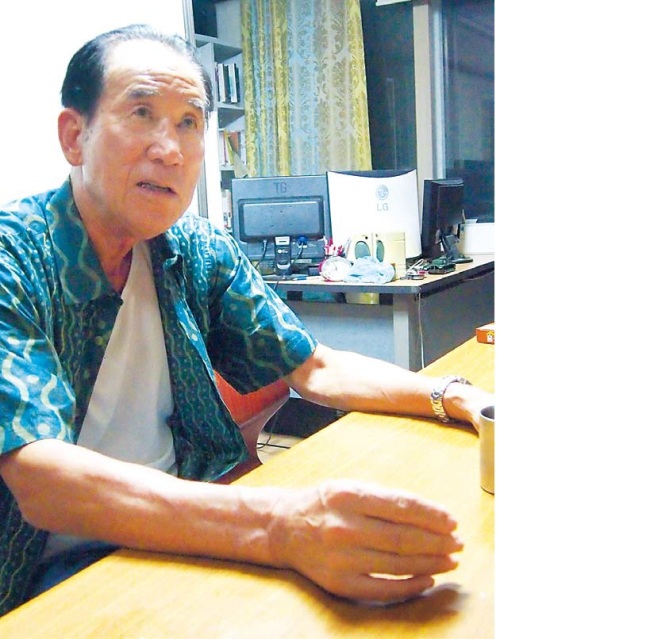GEOCHANG ― Last month, the Education Ministry rolled out an ordinance on promotion of “character building education,” in an apparent attempt to reform the nation’s education that has been stigmatized as fueling excessive competition among students for top grades.
But Chun Sung-eun, formerly a principal of Geochang High School and head of a presidential education committee during the Roh Moo-hyun administration, said education reform is impossible without overhauling the chain of command connecting the Education Ministry, local education offices and individual schools.
“The key to overhauling the system is who gets to make the calls related to education. Individual schools should have the final say-so when it comes to deciding education-related changes,” said the 71-year-old educator, who spent over 40 years as a teacher and education reformer in the provincial town of Geochang, South Gyeongsang Province.
For decades, Geochang High School has gained nationwide fame under Chun’s auspices for its unorthodox methods that encompasses a strong character-building process, while enjoying its share of success in being among the nation’s top high schools in college admission process as well.
In the 1990s, the tiny school in rural Korea was put on the map after then-President Kim Young-sam praised Chun for the success of his school.
 |
| Chun Sung-eun (Yoon Min-sik/The Korea Herald) |
Chun has been one of most outspoken opponents of South Korea’s top-down education system.
In Korea, schools in 17 provinces and cities across the country are under the supervision of their education offices, which are in turn are supervised by the Education Ministry. The curricular revision, textbook authorization and pursuit of major education policies are decided by the authorities and relayed back to schools in a top-down manner.
The hierarchy, which the system is based on, hinders the education reform process, he argued.
Added to that, Korean parents’ education fever is legendary. On the coattails of the government rolling out its plans for character building education, private institutes for character building have popped up, scurrying to catch the attention of the zealous parents.
Chun said this was the side effect of a defective education system, which has all of the students racing toward a single goal: getting accepted at a prestigious university.
Instead of evaluating each student’s talents and needs, the education system lines them up in an order based on their test grades.
“Our education has pushed children into a pit of constantly escalating competition. Parents had no choice as their children’s success is only based on school grades,” he said. “This is a sin committed by our education on the people of Korea.”
Tackling relatively minor issues like “character education” will do little to change this culture of competition, he said.
“Since Korea’s liberation in 1945, there has never been a real education policy on the Korean peninsula,” he said, adding that the only way is to completely change how we approach education.
According to Chun, the relationship between the school and the ministry should be on equal footings in which the authorities can provide support for each individual school instead of dictating how they should be operated.
“The discord between education policymakers and those in the field is due to the ministry’s excessive control,” he said. “Schools and teachers should have the liberty to design their own plans on how to teach their subjects.”
Korea’s college evaluation, for example, has come under criticism for making higher education institutes into de facto cram schools for seeking jobs. Major criteria in the reform involves the employment rate of schools’ graduates, which results in the institutes shutting down departments that have low employment rates, like those in humanities.
Chun said evaluation should not be conducted by authorities, who have the power to control schools’ budgets. Instead independent assessment bodies should evaluate the teachers and schools. Chun called it the “triangle model” of education ― independent evaluation, the ministry’s support and each school dictating how to operate itself.
The model was devised when the former principal was working as the inaugural head of the Presidential Committee on Education Innovation, formed in 2003 by then-President Roh Moo-hyun. The “admission officer program,” which has universities evaluate students on not just grades, but various other qualities, was a brainchild of the committee.
The point of the program was to ensure that admission offices would get to assess what each student is good at, rather than looking at his or her test scores. An ideal way is to get students to create a portfolio in the admission process, which would contain one’s curricular and extracurricular activities, Chun said.
Chun said the school system should be more about just going to a top-tier school in the next phase. Elementary level education should be about letting children find out what they are good at; secondary education should help students judge which policies are the most beneficial to themselves.
Over the past few years, there has been a debate in Korea about whether teachers should remain politically neutral. “A democratic society allows all members to state what they believe in. As long as secondary education helps students have critical views of policies, teachers should be able to make political statements,” he said.
Higher education, finally, should be about maximizing the students’ talents and potential, he concluded.
Basically education has to be about preparing students for their future, which includes helping them to choose their prospective careers, he said. As principal of Geochang High School, Chun and his colleagues introduced the so-called “10 commandments of choosing a job,” which went viral across the country soon after.
Among the ideas promoted are urging students to choose the job they are needed in, instead of one that they desire to work in. It also encourages students to seek new frontiers and not to let low wage, lack of promotion or social status discourage them from searching for their goal.
But the efforts by his school was not enough, Chun said. “All I could do was arm my students mentally,” he said.
By Yoon Min-sik
(minsikyoon@heraldcorp.com)

